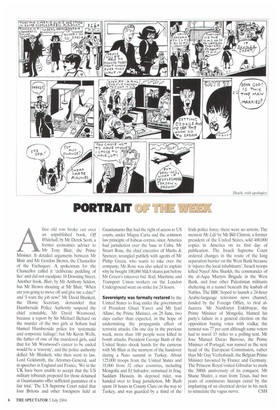A fine old row broke out over an unpublished book, Off
Whitehall, by Mr Derek Scott, a former economics adviser to Mr Tony Blair, the Prime Minister. It detailed arguments between Mr Blair and Mr Gordon Brown, the Chancellor of the Exchequer. A spokesman for the Chancellor called it 'deliberate peddling of lies' and did not exculpate 10 Downing Street. Another book, Blair, by Mr Anthony Seldon, has Mr Brown shouting at Mr Blair, 'When are you going to move off and give me a date?' and 'I want the job now!' Mr David Blunkett. the Home Secretary, demanded that Humberside Police Authority suspend the chief constable, Mr David Westwood, because a report by Sir Michael Bichard on the murder of the two girls at Soham had blamed Humberside police for 'systematic and corporate failings'; but Mr Kevin Wells, the father of one of the murdered girls, said that for Mr Westwood's career to be ended would be a 'travesty', and the police authority defied Mr Blunkett, who then went to law. Lord Goldsmith, the Attorney-General, said in speeches in England and France, 'We in the UK have been unable to accept that the US military tribunals proposed for those detained at Guantanamo offer sufficient guarantee of a fair trial.' The US Supreme Court ruled that four Britons and other foreigners held at
Guantanamo Bay had the right of access to US courts, under Magna Carta and the common law principle of habeas corpus, since America had jurisdiction over the base in Cuba. Mr Stuart Rose. the chief executive of Marks & Spencer, wrangled publicly with agents of Mr Philip Green, who wants to take over the company; Mr Rose was also asked to explain why he bought 100,000 M&S shares just before Mr Green's takeover bid. Rail, Maritime and Transport Union workers on the London Underground went on strike for 24 hours.
Sovereignty was formally restored by the United States to Iraq under the government of President Ghazi Yawer and Mr Iyad Allawi, the Prime Minister, on 28 June, two days earlier than expected, in the hope of undermining the propaganda effect of terrorist attacks. On one day in the previous week, more than 100 people were killed in bomb attacks. President George Bush of the United States shook hands for the cameras with Mr Blair at the moment of the handover during a Nato summit in Turkey. About 125,000 troops from the United States and 35,000 from 32 other countries, including Mongolia and El Salvador, remained in Iraq. Saddam Hussein, its deposed ruler, was handed over to Iraqi jurisdiction. Mr Bush spent 18 hours in County Clare on the way to Turkey, and was guarded by a third of the Irish police force; there were no arrests. The memoir My Life by Mr Bill Clinton, a former president of the United States, sold 400,000 copies in America on its first day of publication. The Israeli Supreme Court ordered changes in the route of the long separation barrier on the West Bank because it 'injures the local inhabitants'. Israeli troops killed Nayef Abu Sharkh, the commander of the al-Aqsa Martyrs Brigade in the West Bank, and four other Palestinian militants sheltering in a tunnel beneath the kasbah of Nablus. The BBC hoped to launch a 24-hour Arabic-language television news channel, funded by the Foreign Office, to rival alJazeera. Mr Nambaryn Enkhbayar, the Prime Minister of Mongolia, blamed his party's failure in a general election on the opposition buying votes with vodka; the turnout was 77 per cent although some voters had to travel 15 miles to a polling tent. Mr Jose Manuel Durao Barroso, the Prime Minister of Portugal, was named as the next head of the European Commission, rather than Mr Guy Verhofstadt, the Belgian Prime Minister favoured by France and Germany. The Princess Royal visited Gibraltar to mark the 300th anniversary of its conquest. Mr Shane Shafer, a man from Texas, had two years of continuous hiccups cured by the implanting of an electrical device in his neck
to stimulate the vagus nerve. CSH


































































 Previous page
Previous page